E-Contracts, Consumer Protection, and Electronic Transactions
VerifiedAdded on 2023/01/16
|9
|3563
|82
Report
AI Summary
This report provides a detailed analysis of e-contracts, focusing on their formation, legality, and consumer protection, particularly within the context of Kuwaiti law. It explores the evolution of e-contracts, emphasizing the impact of the internet on business transactions and the need for legally binding agreements. The report examines how laws provide consumer protection in e-contracts, both generally and specifically in Kuwait, and compares Kuwait's electronic transaction law with those of the GCC. It also discusses the importance of personal data protection under Kuwaiti law, including the regulation of electronic signatures and payments. Furthermore, the report addresses the legal requirements for electronic documents and signatures, as well as the role of the Central Bank of Kuwait in regulating electronic payment transactions. The report offers insights into the legal landscape of e-commerce and electronic transactions.

E-Contracts 1
E-Contracts
Student’s Name
Course
Professor’s Name
University
Date
E-Contracts
Student’s Name
Course
Professor’s Name
University
Date
Paraphrase This Document
Need a fresh take? Get an instant paraphrase of this document with our AI Paraphraser
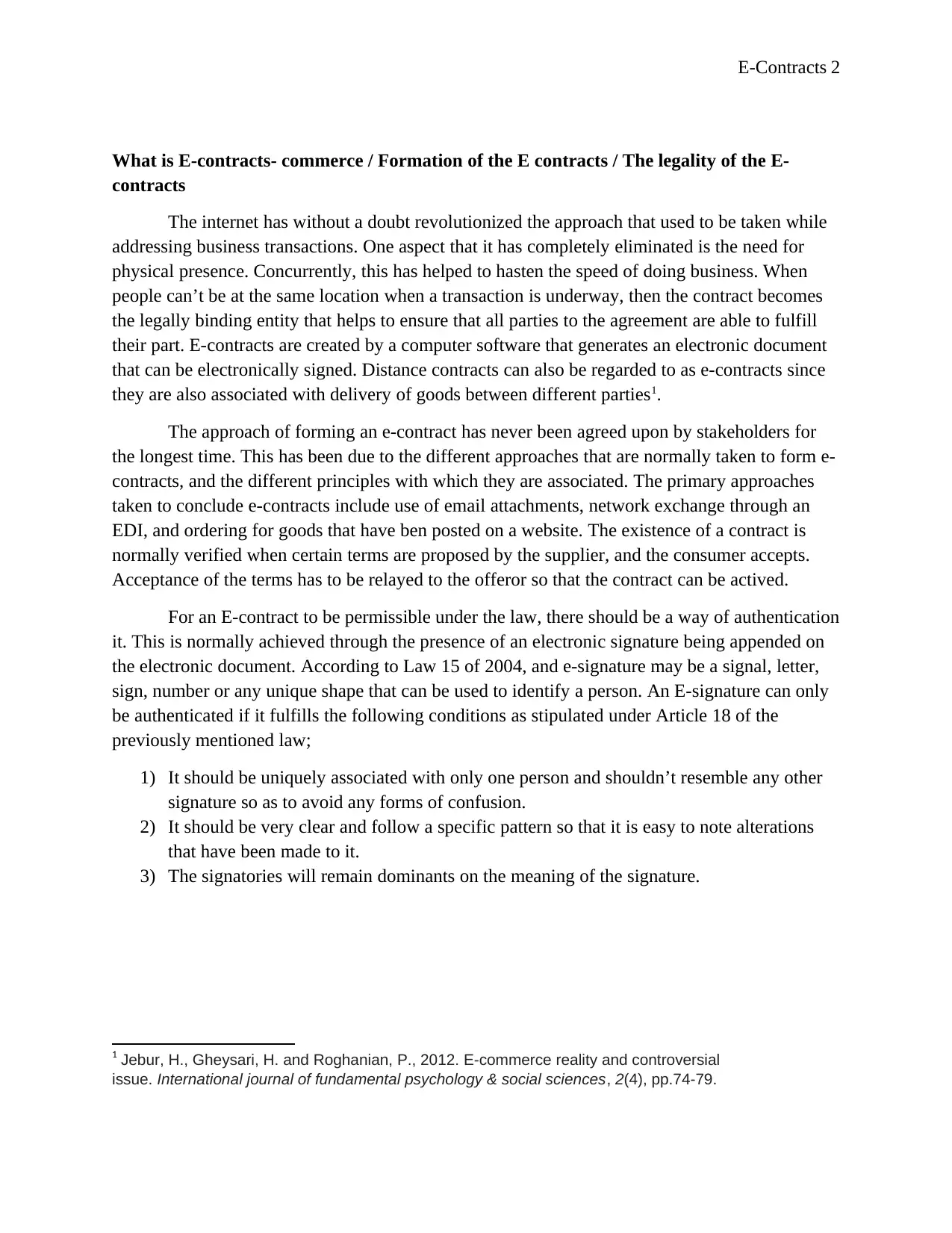
E-Contracts 2
What is E-contracts- commerce / Formation of the E contracts / The legality of the E-
contracts
The internet has without a doubt revolutionized the approach that used to be taken while
addressing business transactions. One aspect that it has completely eliminated is the need for
physical presence. Concurrently, this has helped to hasten the speed of doing business. When
people can’t be at the same location when a transaction is underway, then the contract becomes
the legally binding entity that helps to ensure that all parties to the agreement are able to fulfill
their part. E-contracts are created by a computer software that generates an electronic document
that can be electronically signed. Distance contracts can also be regarded to as e-contracts since
they are also associated with delivery of goods between different parties1.
The approach of forming an e-contract has never been agreed upon by stakeholders for
the longest time. This has been due to the different approaches that are normally taken to form e-
contracts, and the different principles with which they are associated. The primary approaches
taken to conclude e-contracts include use of email attachments, network exchange through an
EDI, and ordering for goods that have ben posted on a website. The existence of a contract is
normally verified when certain terms are proposed by the supplier, and the consumer accepts.
Acceptance of the terms has to be relayed to the offeror so that the contract can be actived.
For an E-contract to be permissible under the law, there should be a way of authentication
it. This is normally achieved through the presence of an electronic signature being appended on
the electronic document. According to Law 15 of 2004, and e-signature may be a signal, letter,
sign, number or any unique shape that can be used to identify a person. An E-signature can only
be authenticated if it fulfills the following conditions as stipulated under Article 18 of the
previously mentioned law;
1) It should be uniquely associated with only one person and shouldn’t resemble any other
signature so as to avoid any forms of confusion.
2) It should be very clear and follow a specific pattern so that it is easy to note alterations
that have been made to it.
3) The signatories will remain dominants on the meaning of the signature.
1 Jebur, H., Gheysari, H. and Roghanian, P., 2012. E-commerce reality and controversial
issue. International journal of fundamental psychology & social sciences, 2(4), pp.74-79.
What is E-contracts- commerce / Formation of the E contracts / The legality of the E-
contracts
The internet has without a doubt revolutionized the approach that used to be taken while
addressing business transactions. One aspect that it has completely eliminated is the need for
physical presence. Concurrently, this has helped to hasten the speed of doing business. When
people can’t be at the same location when a transaction is underway, then the contract becomes
the legally binding entity that helps to ensure that all parties to the agreement are able to fulfill
their part. E-contracts are created by a computer software that generates an electronic document
that can be electronically signed. Distance contracts can also be regarded to as e-contracts since
they are also associated with delivery of goods between different parties1.
The approach of forming an e-contract has never been agreed upon by stakeholders for
the longest time. This has been due to the different approaches that are normally taken to form e-
contracts, and the different principles with which they are associated. The primary approaches
taken to conclude e-contracts include use of email attachments, network exchange through an
EDI, and ordering for goods that have ben posted on a website. The existence of a contract is
normally verified when certain terms are proposed by the supplier, and the consumer accepts.
Acceptance of the terms has to be relayed to the offeror so that the contract can be actived.
For an E-contract to be permissible under the law, there should be a way of authentication
it. This is normally achieved through the presence of an electronic signature being appended on
the electronic document. According to Law 15 of 2004, and e-signature may be a signal, letter,
sign, number or any unique shape that can be used to identify a person. An E-signature can only
be authenticated if it fulfills the following conditions as stipulated under Article 18 of the
previously mentioned law;
1) It should be uniquely associated with only one person and shouldn’t resemble any other
signature so as to avoid any forms of confusion.
2) It should be very clear and follow a specific pattern so that it is easy to note alterations
that have been made to it.
3) The signatories will remain dominants on the meaning of the signature.
1 Jebur, H., Gheysari, H. and Roghanian, P., 2012. E-commerce reality and controversial
issue. International journal of fundamental psychology & social sciences, 2(4), pp.74-79.
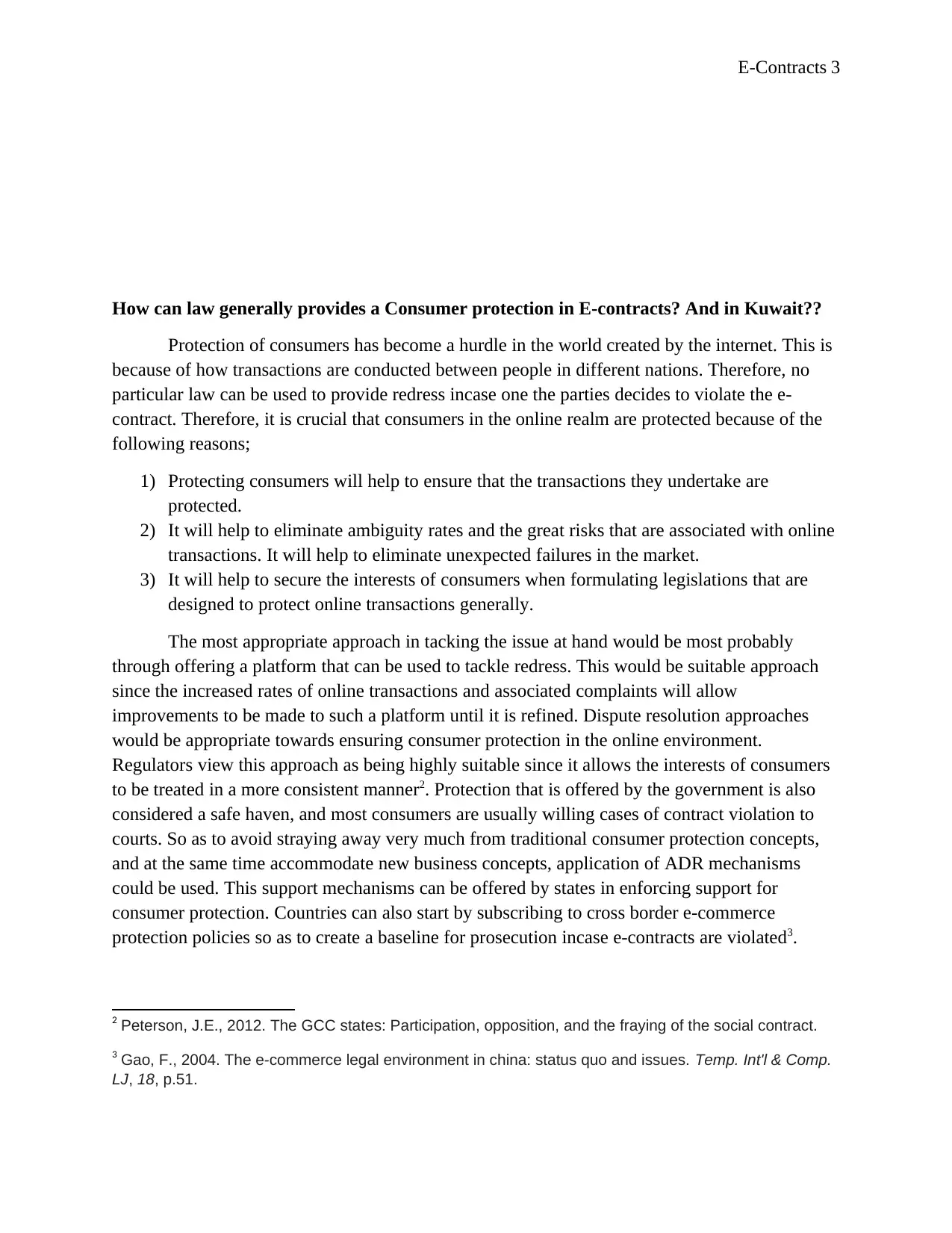
E-Contracts 3
How can law generally provides a Consumer protection in E-contracts? And in Kuwait??
Protection of consumers has become a hurdle in the world created by the internet. This is
because of how transactions are conducted between people in different nations. Therefore, no
particular law can be used to provide redress incase one the parties decides to violate the e-
contract. Therefore, it is crucial that consumers in the online realm are protected because of the
following reasons;
1) Protecting consumers will help to ensure that the transactions they undertake are
protected.
2) It will help to eliminate ambiguity rates and the great risks that are associated with online
transactions. It will help to eliminate unexpected failures in the market.
3) It will help to secure the interests of consumers when formulating legislations that are
designed to protect online transactions generally.
The most appropriate approach in tacking the issue at hand would be most probably
through offering a platform that can be used to tackle redress. This would be suitable approach
since the increased rates of online transactions and associated complaints will allow
improvements to be made to such a platform until it is refined. Dispute resolution approaches
would be appropriate towards ensuring consumer protection in the online environment.
Regulators view this approach as being highly suitable since it allows the interests of consumers
to be treated in a more consistent manner2. Protection that is offered by the government is also
considered a safe haven, and most consumers are usually willing cases of contract violation to
courts. So as to avoid straying away very much from traditional consumer protection concepts,
and at the same time accommodate new business concepts, application of ADR mechanisms
could be used. This support mechanisms can be offered by states in enforcing support for
consumer protection. Countries can also start by subscribing to cross border e-commerce
protection policies so as to create a baseline for prosecution incase e-contracts are violated3.
2 Peterson, J.E., 2012. The GCC states: Participation, opposition, and the fraying of the social contract.
3 Gao, F., 2004. The e-commerce legal environment in china: status quo and issues. Temp. Int'l & Comp.
LJ, 18, p.51.
How can law generally provides a Consumer protection in E-contracts? And in Kuwait??
Protection of consumers has become a hurdle in the world created by the internet. This is
because of how transactions are conducted between people in different nations. Therefore, no
particular law can be used to provide redress incase one the parties decides to violate the e-
contract. Therefore, it is crucial that consumers in the online realm are protected because of the
following reasons;
1) Protecting consumers will help to ensure that the transactions they undertake are
protected.
2) It will help to eliminate ambiguity rates and the great risks that are associated with online
transactions. It will help to eliminate unexpected failures in the market.
3) It will help to secure the interests of consumers when formulating legislations that are
designed to protect online transactions generally.
The most appropriate approach in tacking the issue at hand would be most probably
through offering a platform that can be used to tackle redress. This would be suitable approach
since the increased rates of online transactions and associated complaints will allow
improvements to be made to such a platform until it is refined. Dispute resolution approaches
would be appropriate towards ensuring consumer protection in the online environment.
Regulators view this approach as being highly suitable since it allows the interests of consumers
to be treated in a more consistent manner2. Protection that is offered by the government is also
considered a safe haven, and most consumers are usually willing cases of contract violation to
courts. So as to avoid straying away very much from traditional consumer protection concepts,
and at the same time accommodate new business concepts, application of ADR mechanisms
could be used. This support mechanisms can be offered by states in enforcing support for
consumer protection. Countries can also start by subscribing to cross border e-commerce
protection policies so as to create a baseline for prosecution incase e-contracts are violated3.
2 Peterson, J.E., 2012. The GCC states: Participation, opposition, and the fraying of the social contract.
3 Gao, F., 2004. The e-commerce legal environment in china: status quo and issues. Temp. Int'l & Comp.
LJ, 18, p.51.
⊘ This is a preview!⊘
Do you want full access?
Subscribe today to unlock all pages.

Trusted by 1+ million students worldwide
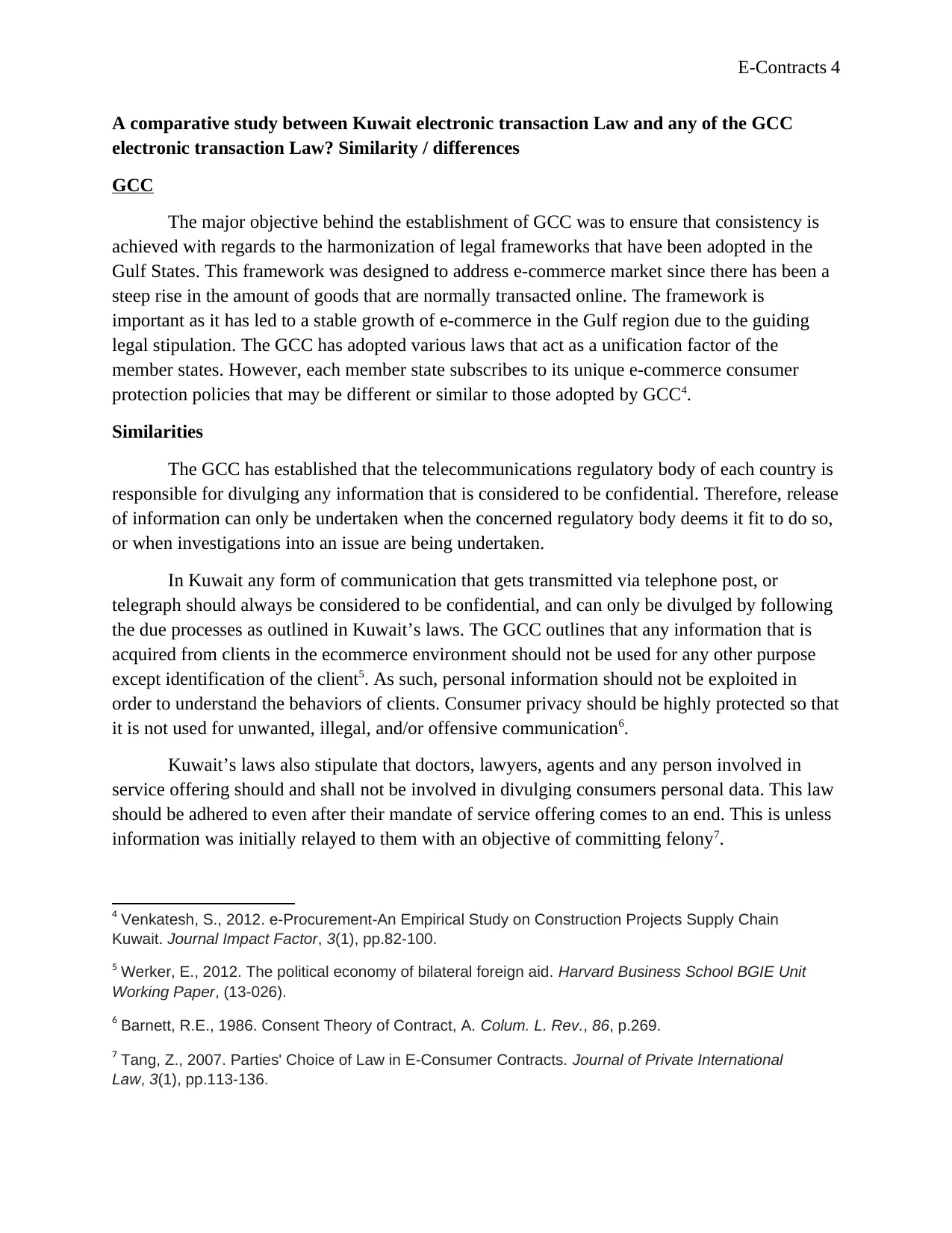
E-Contracts 4
A comparative study between Kuwait electronic transaction Law and any of the GCC
electronic transaction Law? Similarity / differences
GCC
The major objective behind the establishment of GCC was to ensure that consistency is
achieved with regards to the harmonization of legal frameworks that have been adopted in the
Gulf States. This framework was designed to address e-commerce market since there has been a
steep rise in the amount of goods that are normally transacted online. The framework is
important as it has led to a stable growth of e-commerce in the Gulf region due to the guiding
legal stipulation. The GCC has adopted various laws that act as a unification factor of the
member states. However, each member state subscribes to its unique e-commerce consumer
protection policies that may be different or similar to those adopted by GCC4.
Similarities
The GCC has established that the telecommunications regulatory body of each country is
responsible for divulging any information that is considered to be confidential. Therefore, release
of information can only be undertaken when the concerned regulatory body deems it fit to do so,
or when investigations into an issue are being undertaken.
In Kuwait any form of communication that gets transmitted via telephone post, or
telegraph should always be considered to be confidential, and can only be divulged by following
the due processes as outlined in Kuwait’s laws. The GCC outlines that any information that is
acquired from clients in the ecommerce environment should not be used for any other purpose
except identification of the client5. As such, personal information should not be exploited in
order to understand the behaviors of clients. Consumer privacy should be highly protected so that
it is not used for unwanted, illegal, and/or offensive communication6.
Kuwait’s laws also stipulate that doctors, lawyers, agents and any person involved in
service offering should and shall not be involved in divulging consumers personal data. This law
should be adhered to even after their mandate of service offering comes to an end. This is unless
information was initially relayed to them with an objective of committing felony7.
4 Venkatesh, S., 2012. e-Procurement-An Empirical Study on Construction Projects Supply Chain
Kuwait. Journal Impact Factor, 3(1), pp.82-100.
5 Werker, E., 2012. The political economy of bilateral foreign aid. Harvard Business School BGIE Unit
Working Paper, (13-026).
6 Barnett, R.E., 1986. Consent Theory of Contract, A. Colum. L. Rev., 86, p.269.
7 Tang, Z., 2007. Parties' Choice of Law in E-Consumer Contracts. Journal of Private International
Law, 3(1), pp.113-136.
A comparative study between Kuwait electronic transaction Law and any of the GCC
electronic transaction Law? Similarity / differences
GCC
The major objective behind the establishment of GCC was to ensure that consistency is
achieved with regards to the harmonization of legal frameworks that have been adopted in the
Gulf States. This framework was designed to address e-commerce market since there has been a
steep rise in the amount of goods that are normally transacted online. The framework is
important as it has led to a stable growth of e-commerce in the Gulf region due to the guiding
legal stipulation. The GCC has adopted various laws that act as a unification factor of the
member states. However, each member state subscribes to its unique e-commerce consumer
protection policies that may be different or similar to those adopted by GCC4.
Similarities
The GCC has established that the telecommunications regulatory body of each country is
responsible for divulging any information that is considered to be confidential. Therefore, release
of information can only be undertaken when the concerned regulatory body deems it fit to do so,
or when investigations into an issue are being undertaken.
In Kuwait any form of communication that gets transmitted via telephone post, or
telegraph should always be considered to be confidential, and can only be divulged by following
the due processes as outlined in Kuwait’s laws. The GCC outlines that any information that is
acquired from clients in the ecommerce environment should not be used for any other purpose
except identification of the client5. As such, personal information should not be exploited in
order to understand the behaviors of clients. Consumer privacy should be highly protected so that
it is not used for unwanted, illegal, and/or offensive communication6.
Kuwait’s laws also stipulate that doctors, lawyers, agents and any person involved in
service offering should and shall not be involved in divulging consumers personal data. This law
should be adhered to even after their mandate of service offering comes to an end. This is unless
information was initially relayed to them with an objective of committing felony7.
4 Venkatesh, S., 2012. e-Procurement-An Empirical Study on Construction Projects Supply Chain
Kuwait. Journal Impact Factor, 3(1), pp.82-100.
5 Werker, E., 2012. The political economy of bilateral foreign aid. Harvard Business School BGIE Unit
Working Paper, (13-026).
6 Barnett, R.E., 1986. Consent Theory of Contract, A. Colum. L. Rev., 86, p.269.
7 Tang, Z., 2007. Parties' Choice of Law in E-Consumer Contracts. Journal of Private International
Law, 3(1), pp.113-136.
Paraphrase This Document
Need a fresh take? Get an instant paraphrase of this document with our AI Paraphraser
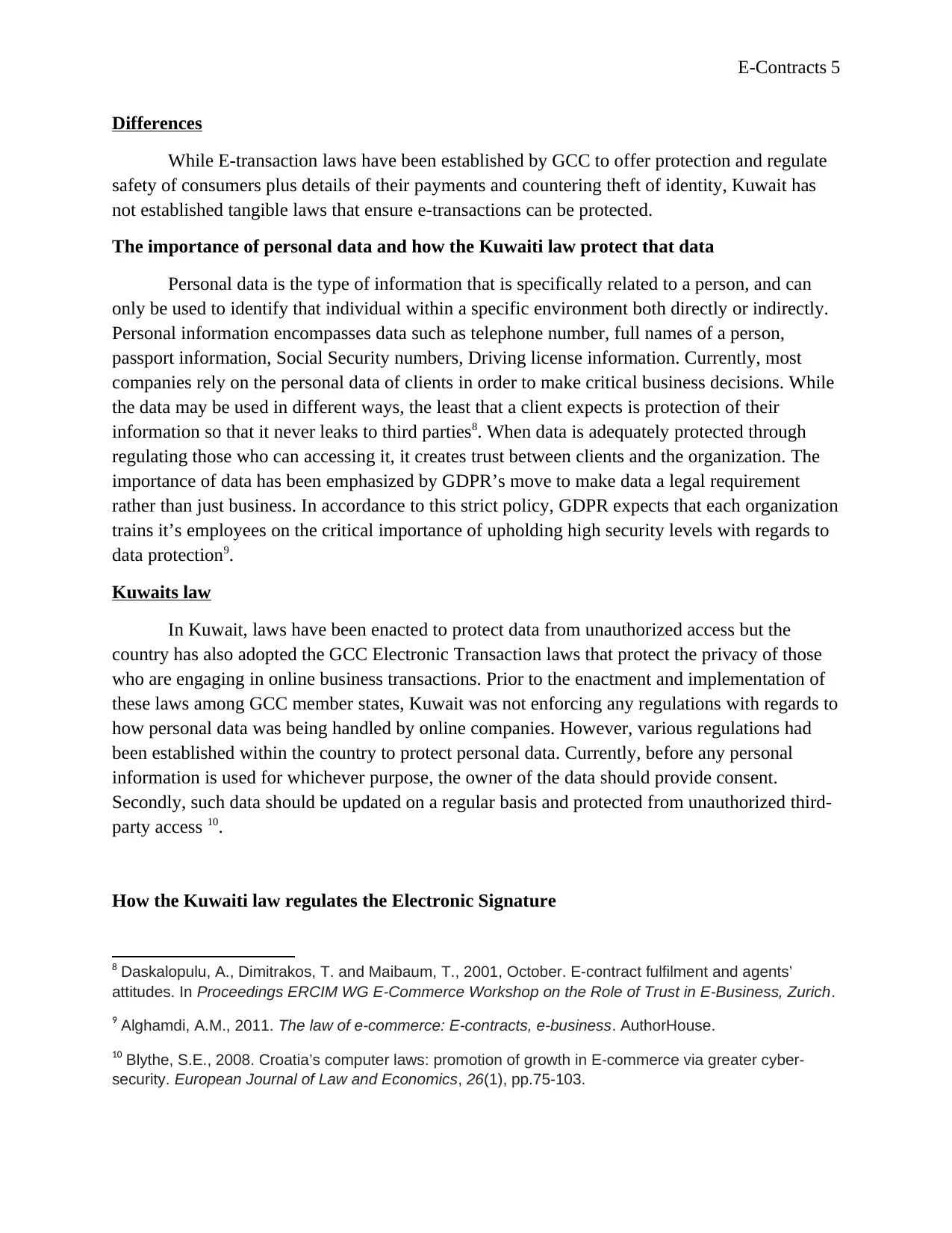
E-Contracts 5
Differences
While E-transaction laws have been established by GCC to offer protection and regulate
safety of consumers plus details of their payments and countering theft of identity, Kuwait has
not established tangible laws that ensure e-transactions can be protected.
The importance of personal data and how the Kuwaiti law protect that data
Personal data is the type of information that is specifically related to a person, and can
only be used to identify that individual within a specific environment both directly or indirectly.
Personal information encompasses data such as telephone number, full names of a person,
passport information, Social Security numbers, Driving license information. Currently, most
companies rely on the personal data of clients in order to make critical business decisions. While
the data may be used in different ways, the least that a client expects is protection of their
information so that it never leaks to third parties8. When data is adequately protected through
regulating those who can accessing it, it creates trust between clients and the organization. The
importance of data has been emphasized by GDPR’s move to make data a legal requirement
rather than just business. In accordance to this strict policy, GDPR expects that each organization
trains it’s employees on the critical importance of upholding high security levels with regards to
data protection9.
Kuwaits law
In Kuwait, laws have been enacted to protect data from unauthorized access but the
country has also adopted the GCC Electronic Transaction laws that protect the privacy of those
who are engaging in online business transactions. Prior to the enactment and implementation of
these laws among GCC member states, Kuwait was not enforcing any regulations with regards to
how personal data was being handled by online companies. However, various regulations had
been established within the country to protect personal data. Currently, before any personal
information is used for whichever purpose, the owner of the data should provide consent.
Secondly, such data should be updated on a regular basis and protected from unauthorized third-
party access 10.
How the Kuwaiti law regulates the Electronic Signature
8 Daskalopulu, A., Dimitrakos, T. and Maibaum, T., 2001, October. E-contract fulfilment and agents’
attitudes. In Proceedings ERCIM WG E-Commerce Workshop on the Role of Trust in E-Business, Zurich.
9 Alghamdi, A.M., 2011. The law of e-commerce: E-contracts, e-business. AuthorHouse.
10 Blythe, S.E., 2008. Croatia’s computer laws: promotion of growth in E-commerce via greater cyber-
security. European Journal of Law and Economics, 26(1), pp.75-103.
Differences
While E-transaction laws have been established by GCC to offer protection and regulate
safety of consumers plus details of their payments and countering theft of identity, Kuwait has
not established tangible laws that ensure e-transactions can be protected.
The importance of personal data and how the Kuwaiti law protect that data
Personal data is the type of information that is specifically related to a person, and can
only be used to identify that individual within a specific environment both directly or indirectly.
Personal information encompasses data such as telephone number, full names of a person,
passport information, Social Security numbers, Driving license information. Currently, most
companies rely on the personal data of clients in order to make critical business decisions. While
the data may be used in different ways, the least that a client expects is protection of their
information so that it never leaks to third parties8. When data is adequately protected through
regulating those who can accessing it, it creates trust between clients and the organization. The
importance of data has been emphasized by GDPR’s move to make data a legal requirement
rather than just business. In accordance to this strict policy, GDPR expects that each organization
trains it’s employees on the critical importance of upholding high security levels with regards to
data protection9.
Kuwaits law
In Kuwait, laws have been enacted to protect data from unauthorized access but the
country has also adopted the GCC Electronic Transaction laws that protect the privacy of those
who are engaging in online business transactions. Prior to the enactment and implementation of
these laws among GCC member states, Kuwait was not enforcing any regulations with regards to
how personal data was being handled by online companies. However, various regulations had
been established within the country to protect personal data. Currently, before any personal
information is used for whichever purpose, the owner of the data should provide consent.
Secondly, such data should be updated on a regular basis and protected from unauthorized third-
party access 10.
How the Kuwaiti law regulates the Electronic Signature
8 Daskalopulu, A., Dimitrakos, T. and Maibaum, T., 2001, October. E-contract fulfilment and agents’
attitudes. In Proceedings ERCIM WG E-Commerce Workshop on the Role of Trust in E-Business, Zurich.
9 Alghamdi, A.M., 2011. The law of e-commerce: E-contracts, e-business. AuthorHouse.
10 Blythe, S.E., 2008. Croatia’s computer laws: promotion of growth in E-commerce via greater cyber-
security. European Journal of Law and Economics, 26(1), pp.75-103.
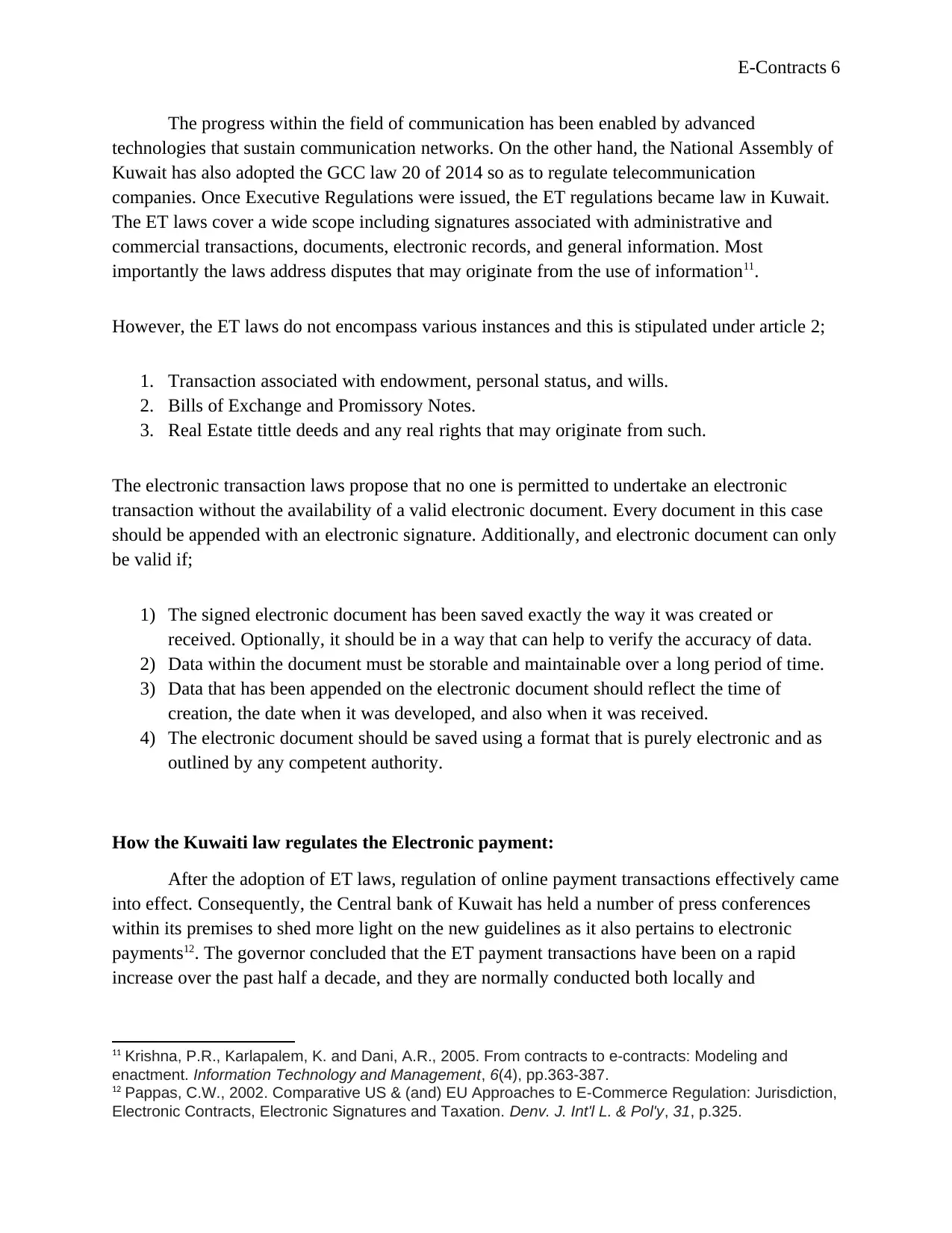
E-Contracts 6
The progress within the field of communication has been enabled by advanced
technologies that sustain communication networks. On the other hand, the National Assembly of
Kuwait has also adopted the GCC law 20 of 2014 so as to regulate telecommunication
companies. Once Executive Regulations were issued, the ET regulations became law in Kuwait.
The ET laws cover a wide scope including signatures associated with administrative and
commercial transactions, documents, electronic records, and general information. Most
importantly the laws address disputes that may originate from the use of information11.
However, the ET laws do not encompass various instances and this is stipulated under article 2;
1. Transaction associated with endowment, personal status, and wills.
2. Bills of Exchange and Promissory Notes.
3. Real Estate tittle deeds and any real rights that may originate from such.
The electronic transaction laws propose that no one is permitted to undertake an electronic
transaction without the availability of a valid electronic document. Every document in this case
should be appended with an electronic signature. Additionally, and electronic document can only
be valid if;
1) The signed electronic document has been saved exactly the way it was created or
received. Optionally, it should be in a way that can help to verify the accuracy of data.
2) Data within the document must be storable and maintainable over a long period of time.
3) Data that has been appended on the electronic document should reflect the time of
creation, the date when it was developed, and also when it was received.
4) The electronic document should be saved using a format that is purely electronic and as
outlined by any competent authority.
How the Kuwaiti law regulates the Electronic payment:
After the adoption of ET laws, regulation of online payment transactions effectively came
into effect. Consequently, the Central bank of Kuwait has held a number of press conferences
within its premises to shed more light on the new guidelines as it also pertains to electronic
payments12. The governor concluded that the ET payment transactions have been on a rapid
increase over the past half a decade, and they are normally conducted both locally and
11 Krishna, P.R., Karlapalem, K. and Dani, A.R., 2005. From contracts to e-contracts: Modeling and
enactment. Information Technology and Management, 6(4), pp.363-387.
12 Pappas, C.W., 2002. Comparative US & (and) EU Approaches to E-Commerce Regulation: Jurisdiction,
Electronic Contracts, Electronic Signatures and Taxation. Denv. J. Int'l L. & Pol'y, 31, p.325.
The progress within the field of communication has been enabled by advanced
technologies that sustain communication networks. On the other hand, the National Assembly of
Kuwait has also adopted the GCC law 20 of 2014 so as to regulate telecommunication
companies. Once Executive Regulations were issued, the ET regulations became law in Kuwait.
The ET laws cover a wide scope including signatures associated with administrative and
commercial transactions, documents, electronic records, and general information. Most
importantly the laws address disputes that may originate from the use of information11.
However, the ET laws do not encompass various instances and this is stipulated under article 2;
1. Transaction associated with endowment, personal status, and wills.
2. Bills of Exchange and Promissory Notes.
3. Real Estate tittle deeds and any real rights that may originate from such.
The electronic transaction laws propose that no one is permitted to undertake an electronic
transaction without the availability of a valid electronic document. Every document in this case
should be appended with an electronic signature. Additionally, and electronic document can only
be valid if;
1) The signed electronic document has been saved exactly the way it was created or
received. Optionally, it should be in a way that can help to verify the accuracy of data.
2) Data within the document must be storable and maintainable over a long period of time.
3) Data that has been appended on the electronic document should reflect the time of
creation, the date when it was developed, and also when it was received.
4) The electronic document should be saved using a format that is purely electronic and as
outlined by any competent authority.
How the Kuwaiti law regulates the Electronic payment:
After the adoption of ET laws, regulation of online payment transactions effectively came
into effect. Consequently, the Central bank of Kuwait has held a number of press conferences
within its premises to shed more light on the new guidelines as it also pertains to electronic
payments12. The governor concluded that the ET payment transactions have been on a rapid
increase over the past half a decade, and they are normally conducted both locally and
11 Krishna, P.R., Karlapalem, K. and Dani, A.R., 2005. From contracts to e-contracts: Modeling and
enactment. Information Technology and Management, 6(4), pp.363-387.
12 Pappas, C.W., 2002. Comparative US & (and) EU Approaches to E-Commerce Regulation: Jurisdiction,
Electronic Contracts, Electronic Signatures and Taxation. Denv. J. Int'l L. & Pol'y, 31, p.325.
⊘ This is a preview!⊘
Do you want full access?
Subscribe today to unlock all pages.

Trusted by 1+ million students worldwide
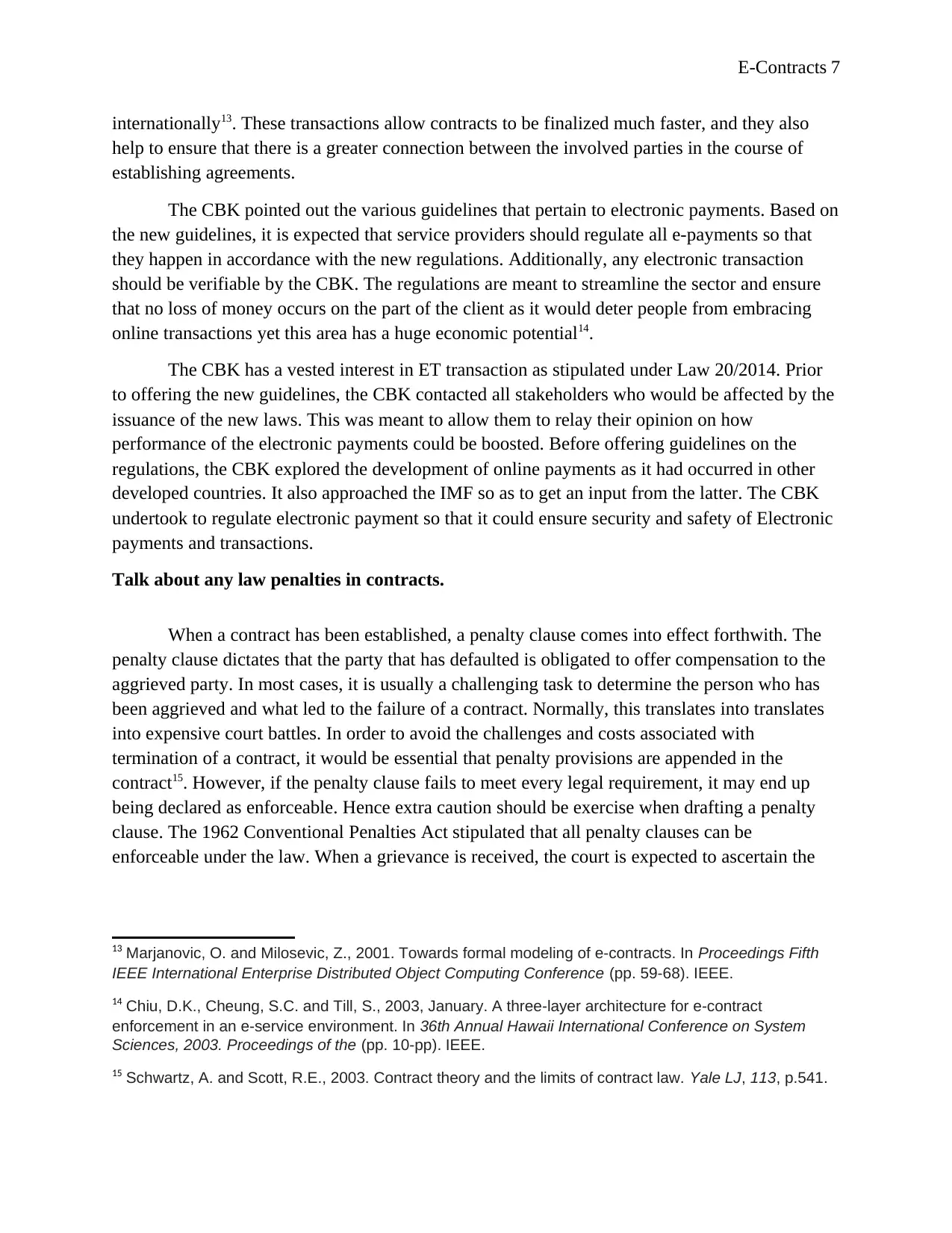
E-Contracts 7
internationally13. These transactions allow contracts to be finalized much faster, and they also
help to ensure that there is a greater connection between the involved parties in the course of
establishing agreements.
The CBK pointed out the various guidelines that pertain to electronic payments. Based on
the new guidelines, it is expected that service providers should regulate all e-payments so that
they happen in accordance with the new regulations. Additionally, any electronic transaction
should be verifiable by the CBK. The regulations are meant to streamline the sector and ensure
that no loss of money occurs on the part of the client as it would deter people from embracing
online transactions yet this area has a huge economic potential14.
The CBK has a vested interest in ET transaction as stipulated under Law 20/2014. Prior
to offering the new guidelines, the CBK contacted all stakeholders who would be affected by the
issuance of the new laws. This was meant to allow them to relay their opinion on how
performance of the electronic payments could be boosted. Before offering guidelines on the
regulations, the CBK explored the development of online payments as it had occurred in other
developed countries. It also approached the IMF so as to get an input from the latter. The CBK
undertook to regulate electronic payment so that it could ensure security and safety of Electronic
payments and transactions.
Talk about any law penalties in contracts.
When a contract has been established, a penalty clause comes into effect forthwith. The
penalty clause dictates that the party that has defaulted is obligated to offer compensation to the
aggrieved party. In most cases, it is usually a challenging task to determine the person who has
been aggrieved and what led to the failure of a contract. Normally, this translates into translates
into expensive court battles. In order to avoid the challenges and costs associated with
termination of a contract, it would be essential that penalty provisions are appended in the
contract15. However, if the penalty clause fails to meet every legal requirement, it may end up
being declared as enforceable. Hence extra caution should be exercise when drafting a penalty
clause. The 1962 Conventional Penalties Act stipulated that all penalty clauses can be
enforceable under the law. When a grievance is received, the court is expected to ascertain the
13 Marjanovic, O. and Milosevic, Z., 2001. Towards formal modeling of e-contracts. In Proceedings Fifth
IEEE International Enterprise Distributed Object Computing Conference (pp. 59-68). IEEE.
14 Chiu, D.K., Cheung, S.C. and Till, S., 2003, January. A three-layer architecture for e-contract
enforcement in an e-service environment. In 36th Annual Hawaii International Conference on System
Sciences, 2003. Proceedings of the (pp. 10-pp). IEEE.
15 Schwartz, A. and Scott, R.E., 2003. Contract theory and the limits of contract law. Yale LJ, 113, p.541.
internationally13. These transactions allow contracts to be finalized much faster, and they also
help to ensure that there is a greater connection between the involved parties in the course of
establishing agreements.
The CBK pointed out the various guidelines that pertain to electronic payments. Based on
the new guidelines, it is expected that service providers should regulate all e-payments so that
they happen in accordance with the new regulations. Additionally, any electronic transaction
should be verifiable by the CBK. The regulations are meant to streamline the sector and ensure
that no loss of money occurs on the part of the client as it would deter people from embracing
online transactions yet this area has a huge economic potential14.
The CBK has a vested interest in ET transaction as stipulated under Law 20/2014. Prior
to offering the new guidelines, the CBK contacted all stakeholders who would be affected by the
issuance of the new laws. This was meant to allow them to relay their opinion on how
performance of the electronic payments could be boosted. Before offering guidelines on the
regulations, the CBK explored the development of online payments as it had occurred in other
developed countries. It also approached the IMF so as to get an input from the latter. The CBK
undertook to regulate electronic payment so that it could ensure security and safety of Electronic
payments and transactions.
Talk about any law penalties in contracts.
When a contract has been established, a penalty clause comes into effect forthwith. The
penalty clause dictates that the party that has defaulted is obligated to offer compensation to the
aggrieved party. In most cases, it is usually a challenging task to determine the person who has
been aggrieved and what led to the failure of a contract. Normally, this translates into translates
into expensive court battles. In order to avoid the challenges and costs associated with
termination of a contract, it would be essential that penalty provisions are appended in the
contract15. However, if the penalty clause fails to meet every legal requirement, it may end up
being declared as enforceable. Hence extra caution should be exercise when drafting a penalty
clause. The 1962 Conventional Penalties Act stipulated that all penalty clauses can be
enforceable under the law. When a grievance is received, the court is expected to ascertain the
13 Marjanovic, O. and Milosevic, Z., 2001. Towards formal modeling of e-contracts. In Proceedings Fifth
IEEE International Enterprise Distributed Object Computing Conference (pp. 59-68). IEEE.
14 Chiu, D.K., Cheung, S.C. and Till, S., 2003, January. A three-layer architecture for e-contract
enforcement in an e-service environment. In 36th Annual Hawaii International Conference on System
Sciences, 2003. Proceedings of the (pp. 10-pp). IEEE.
15 Schwartz, A. and Scott, R.E., 2003. Contract theory and the limits of contract law. Yale LJ, 113, p.541.
Paraphrase This Document
Need a fresh take? Get an instant paraphrase of this document with our AI Paraphraser
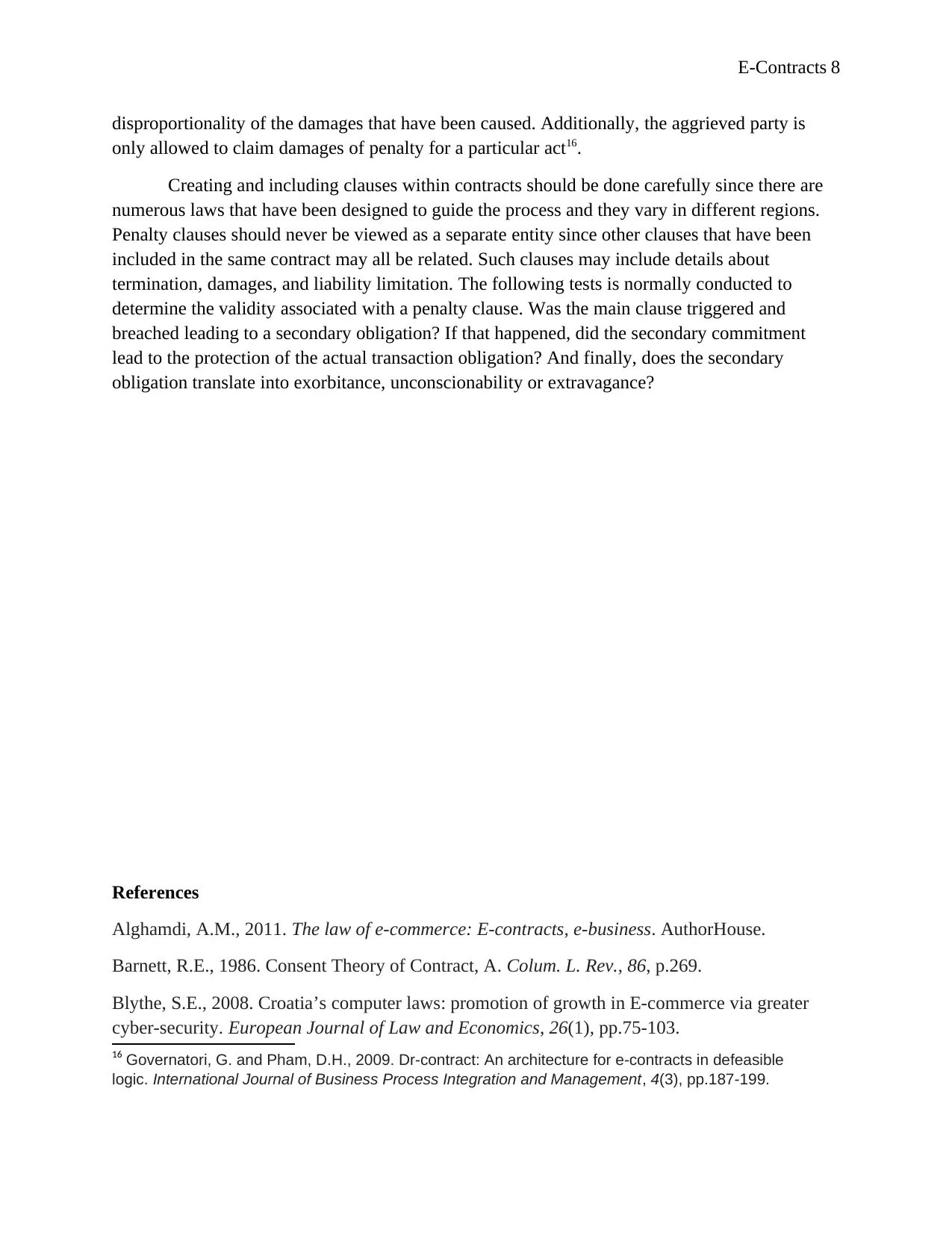
E-Contracts 8
disproportionality of the damages that have been caused. Additionally, the aggrieved party is
only allowed to claim damages of penalty for a particular act16.
Creating and including clauses within contracts should be done carefully since there are
numerous laws that have been designed to guide the process and they vary in different regions.
Penalty clauses should never be viewed as a separate entity since other clauses that have been
included in the same contract may all be related. Such clauses may include details about
termination, damages, and liability limitation. The following tests is normally conducted to
determine the validity associated with a penalty clause. Was the main clause triggered and
breached leading to a secondary obligation? If that happened, did the secondary commitment
lead to the protection of the actual transaction obligation? And finally, does the secondary
obligation translate into exorbitance, unconscionability or extravagance?
References
Alghamdi, A.M., 2011. The law of e-commerce: E-contracts, e-business. AuthorHouse.
Barnett, R.E., 1986. Consent Theory of Contract, A. Colum. L. Rev., 86, p.269.
Blythe, S.E., 2008. Croatia’s computer laws: promotion of growth in E-commerce via greater
cyber-security. European Journal of Law and Economics, 26(1), pp.75-103.
16 Governatori, G. and Pham, D.H., 2009. Dr-contract: An architecture for e-contracts in defeasible
logic. International Journal of Business Process Integration and Management, 4(3), pp.187-199.
disproportionality of the damages that have been caused. Additionally, the aggrieved party is
only allowed to claim damages of penalty for a particular act16.
Creating and including clauses within contracts should be done carefully since there are
numerous laws that have been designed to guide the process and they vary in different regions.
Penalty clauses should never be viewed as a separate entity since other clauses that have been
included in the same contract may all be related. Such clauses may include details about
termination, damages, and liability limitation. The following tests is normally conducted to
determine the validity associated with a penalty clause. Was the main clause triggered and
breached leading to a secondary obligation? If that happened, did the secondary commitment
lead to the protection of the actual transaction obligation? And finally, does the secondary
obligation translate into exorbitance, unconscionability or extravagance?
References
Alghamdi, A.M., 2011. The law of e-commerce: E-contracts, e-business. AuthorHouse.
Barnett, R.E., 1986. Consent Theory of Contract, A. Colum. L. Rev., 86, p.269.
Blythe, S.E., 2008. Croatia’s computer laws: promotion of growth in E-commerce via greater
cyber-security. European Journal of Law and Economics, 26(1), pp.75-103.
16 Governatori, G. and Pham, D.H., 2009. Dr-contract: An architecture for e-contracts in defeasible
logic. International Journal of Business Process Integration and Management, 4(3), pp.187-199.
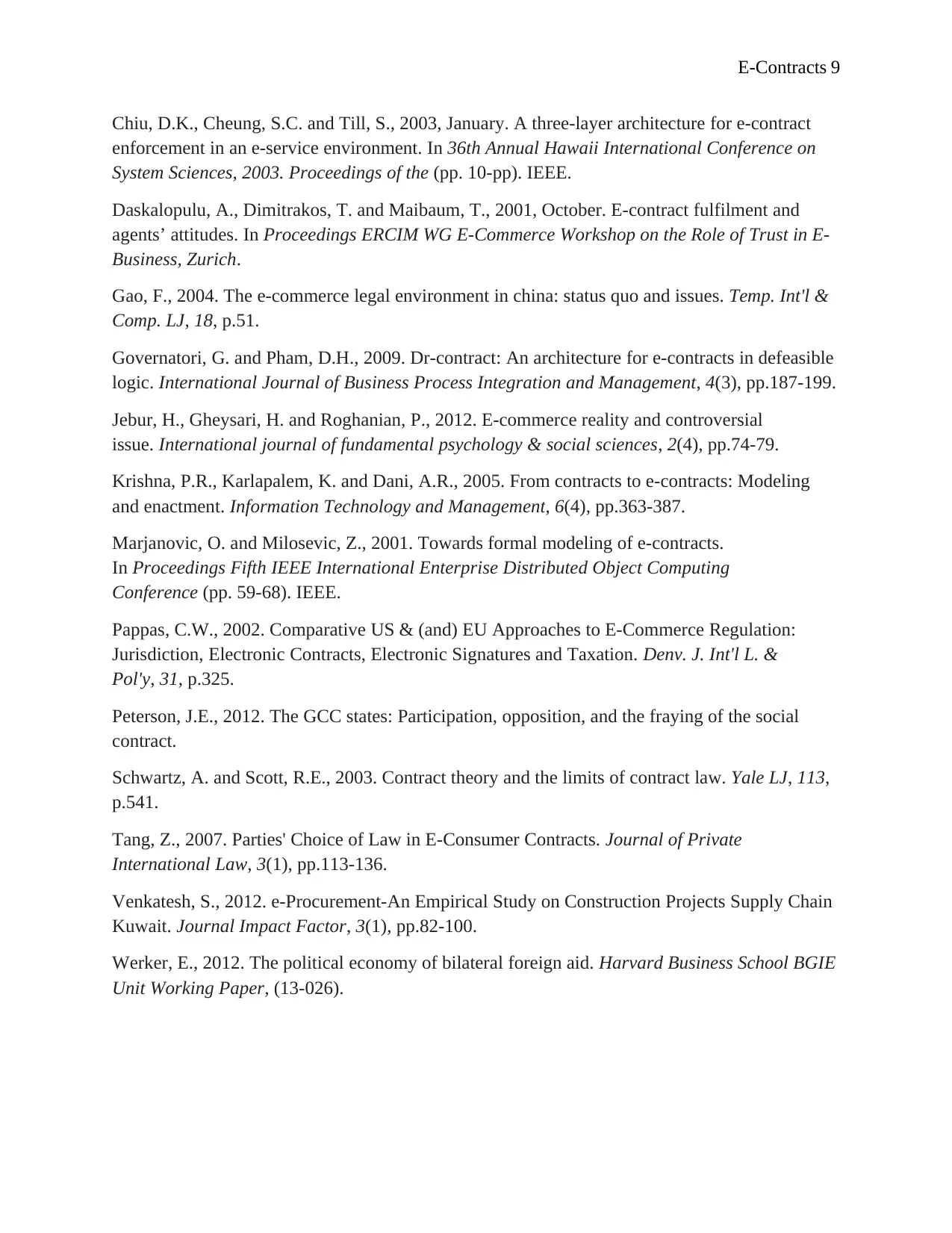
E-Contracts 9
Chiu, D.K., Cheung, S.C. and Till, S., 2003, January. A three-layer architecture for e-contract
enforcement in an e-service environment. In 36th Annual Hawaii International Conference on
System Sciences, 2003. Proceedings of the (pp. 10-pp). IEEE.
Daskalopulu, A., Dimitrakos, T. and Maibaum, T., 2001, October. E-contract fulfilment and
agents’ attitudes. In Proceedings ERCIM WG E-Commerce Workshop on the Role of Trust in E-
Business, Zurich.
Gao, F., 2004. The e-commerce legal environment in china: status quo and issues. Temp. Int'l &
Comp. LJ, 18, p.51.
Governatori, G. and Pham, D.H., 2009. Dr-contract: An architecture for e-contracts in defeasible
logic. International Journal of Business Process Integration and Management, 4(3), pp.187-199.
Jebur, H., Gheysari, H. and Roghanian, P., 2012. E-commerce reality and controversial
issue. International journal of fundamental psychology & social sciences, 2(4), pp.74-79.
Krishna, P.R., Karlapalem, K. and Dani, A.R., 2005. From contracts to e-contracts: Modeling
and enactment. Information Technology and Management, 6(4), pp.363-387.
Marjanovic, O. and Milosevic, Z., 2001. Towards formal modeling of e-contracts.
In Proceedings Fifth IEEE International Enterprise Distributed Object Computing
Conference (pp. 59-68). IEEE.
Pappas, C.W., 2002. Comparative US & (and) EU Approaches to E-Commerce Regulation:
Jurisdiction, Electronic Contracts, Electronic Signatures and Taxation. Denv. J. Int'l L. &
Pol'y, 31, p.325.
Peterson, J.E., 2012. The GCC states: Participation, opposition, and the fraying of the social
contract.
Schwartz, A. and Scott, R.E., 2003. Contract theory and the limits of contract law. Yale LJ, 113,
p.541.
Tang, Z., 2007. Parties' Choice of Law in E-Consumer Contracts. Journal of Private
International Law, 3(1), pp.113-136.
Venkatesh, S., 2012. e-Procurement-An Empirical Study on Construction Projects Supply Chain
Kuwait. Journal Impact Factor, 3(1), pp.82-100.
Werker, E., 2012. The political economy of bilateral foreign aid. Harvard Business School BGIE
Unit Working Paper, (13-026).
Chiu, D.K., Cheung, S.C. and Till, S., 2003, January. A three-layer architecture for e-contract
enforcement in an e-service environment. In 36th Annual Hawaii International Conference on
System Sciences, 2003. Proceedings of the (pp. 10-pp). IEEE.
Daskalopulu, A., Dimitrakos, T. and Maibaum, T., 2001, October. E-contract fulfilment and
agents’ attitudes. In Proceedings ERCIM WG E-Commerce Workshop on the Role of Trust in E-
Business, Zurich.
Gao, F., 2004. The e-commerce legal environment in china: status quo and issues. Temp. Int'l &
Comp. LJ, 18, p.51.
Governatori, G. and Pham, D.H., 2009. Dr-contract: An architecture for e-contracts in defeasible
logic. International Journal of Business Process Integration and Management, 4(3), pp.187-199.
Jebur, H., Gheysari, H. and Roghanian, P., 2012. E-commerce reality and controversial
issue. International journal of fundamental psychology & social sciences, 2(4), pp.74-79.
Krishna, P.R., Karlapalem, K. and Dani, A.R., 2005. From contracts to e-contracts: Modeling
and enactment. Information Technology and Management, 6(4), pp.363-387.
Marjanovic, O. and Milosevic, Z., 2001. Towards formal modeling of e-contracts.
In Proceedings Fifth IEEE International Enterprise Distributed Object Computing
Conference (pp. 59-68). IEEE.
Pappas, C.W., 2002. Comparative US & (and) EU Approaches to E-Commerce Regulation:
Jurisdiction, Electronic Contracts, Electronic Signatures and Taxation. Denv. J. Int'l L. &
Pol'y, 31, p.325.
Peterson, J.E., 2012. The GCC states: Participation, opposition, and the fraying of the social
contract.
Schwartz, A. and Scott, R.E., 2003. Contract theory and the limits of contract law. Yale LJ, 113,
p.541.
Tang, Z., 2007. Parties' Choice of Law in E-Consumer Contracts. Journal of Private
International Law, 3(1), pp.113-136.
Venkatesh, S., 2012. e-Procurement-An Empirical Study on Construction Projects Supply Chain
Kuwait. Journal Impact Factor, 3(1), pp.82-100.
Werker, E., 2012. The political economy of bilateral foreign aid. Harvard Business School BGIE
Unit Working Paper, (13-026).
⊘ This is a preview!⊘
Do you want full access?
Subscribe today to unlock all pages.

Trusted by 1+ million students worldwide
1 out of 9
Related Documents
Your All-in-One AI-Powered Toolkit for Academic Success.
+13062052269
info@desklib.com
Available 24*7 on WhatsApp / Email
![[object Object]](/_next/static/media/star-bottom.7253800d.svg)
Unlock your academic potential
Copyright © 2020–2025 A2Z Services. All Rights Reserved. Developed and managed by ZUCOL.





